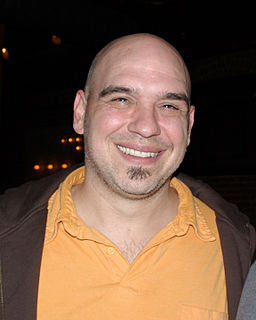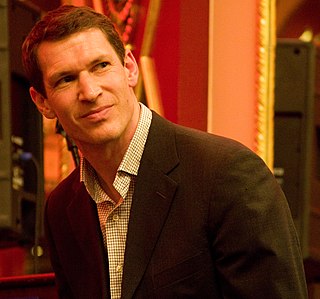A Quote by Terry Pratchett
Sam Vimes could parallel process. Most husbands can. They learn to follow their own line of thought while at the same time listening to what their wives say. And the listening is important, because at any time they could be challenged and must be ready to quote the last sentence in full. A vital additional skill is being able to scan the dialogue for telltale phrases such as "and they can deliver it tomorrow" or "so I've invited them for dinner?" or "they can do it in blue, really quite cheaply.
Quote Topics
Able
Additional
Any
Because
Being
Blue
Challenged
Could
Deliver
Dialogue
Dinner
Follow
Full
Husbands
Important
Invited
Last
Learn
Line
Listening
Most
Must
Own
Parallel
Phrases
Process
Quite
Quote
Ready
Really
Sam
Sam Vimes
Same
Same Time
Say
Scan
Sentence
Skill
Them
Thought
Time
Tomorrow
Vital
While
Wives
Related Quotes
Look at Nelson Mandela. Why did people want to follow him? He's a lousy speaker. If he hadn't got all the other things, you wouldn't spend time listening to him. But people actually don't listen to what he's saying, in a way. They are listening to him because he has communicated that he is ready to put his life on the line.
Listening is more than being quiet. Listening is much more than silence. Listening requires undivided attention. The time to listen is when someone needs to be heard. The time to deal with a person with a problem is when he has the problem. The time to listen is the time when our interest and love are vital to the one who seeks our ear, our heart, our help, and our empathy.
I will do plays as long as they're interested in having me do them. It's the biggest opportunity to learn the most about how to act. Something I discover every time I'm doing one is how little I know about acting - how important the art of listening is, and how important it is to listen with your entire body. You can tell so much of a story with stillness, and a lot of that can be from really actively listening to your scene partner.
That's a nice song,' said young Sam, and Vimes remembered that he was hearing it for the first time. It's an old soldiers' song,' he said. Really, sarge? But it's about angels.' Yes, thought Vimes, and it's amazing what bits those angels cause to rise up as the song progresses. It's a real soldiers' song: sentimental, with dirty bits. As I recall, they used to sing it after battles,’ he said. 'I've seen old men cry when they sing it,’ he added. Why? It sounds cheerful.' They were remembering who they were not singing it with, thought Vimes. You'll learn. I know you will.
Deep Listening is listening to everything all the time, and reminding yourself when you're not. But going below the surface too, it's an active process. It's not passive. I mean hearing is passive in that soundwaves hinge upon the eardrum. You can do both. You can focus and be receptive to your surroundings. If you're tuned out, then you're not in contact with your surroundings. You have to process what you hear. Hearing and listening are not the same thing.
I'm not one for sitting around listening to my own music, because I tend to cringe and think that I could have done better. I also suffer from red light syndrome quite a lot. I tend to narrow my thinking when the red light goes on to record. Instead of just relaxing and playing and emoting, I think of time being wasted so I won't take a chance on something. Consequently, when I hear it back, I think, "Why the hell did I play it so safe on that piece of music when I could have really opened up?" Well, it's because of not wanting to make a mistake.
Death can come at any moment. You could die this afternoon; you could die tomorrow morning; you could die on your way to work; you could die in your sleep. Most of us try to avoid the sense that death can come at any time, but its timing is unknown to us. Can we live each day as if it were our last? Can we relate to one another as if there were no tomorrow?
With soldiers, their wives are so fundamental in their relationships, and yet there's this kind of other war happening back in the States, where wives of soldiers don't quite understand what their husbands have been through, because their husbands won't really talk about it, and that's really the hidden war.
































